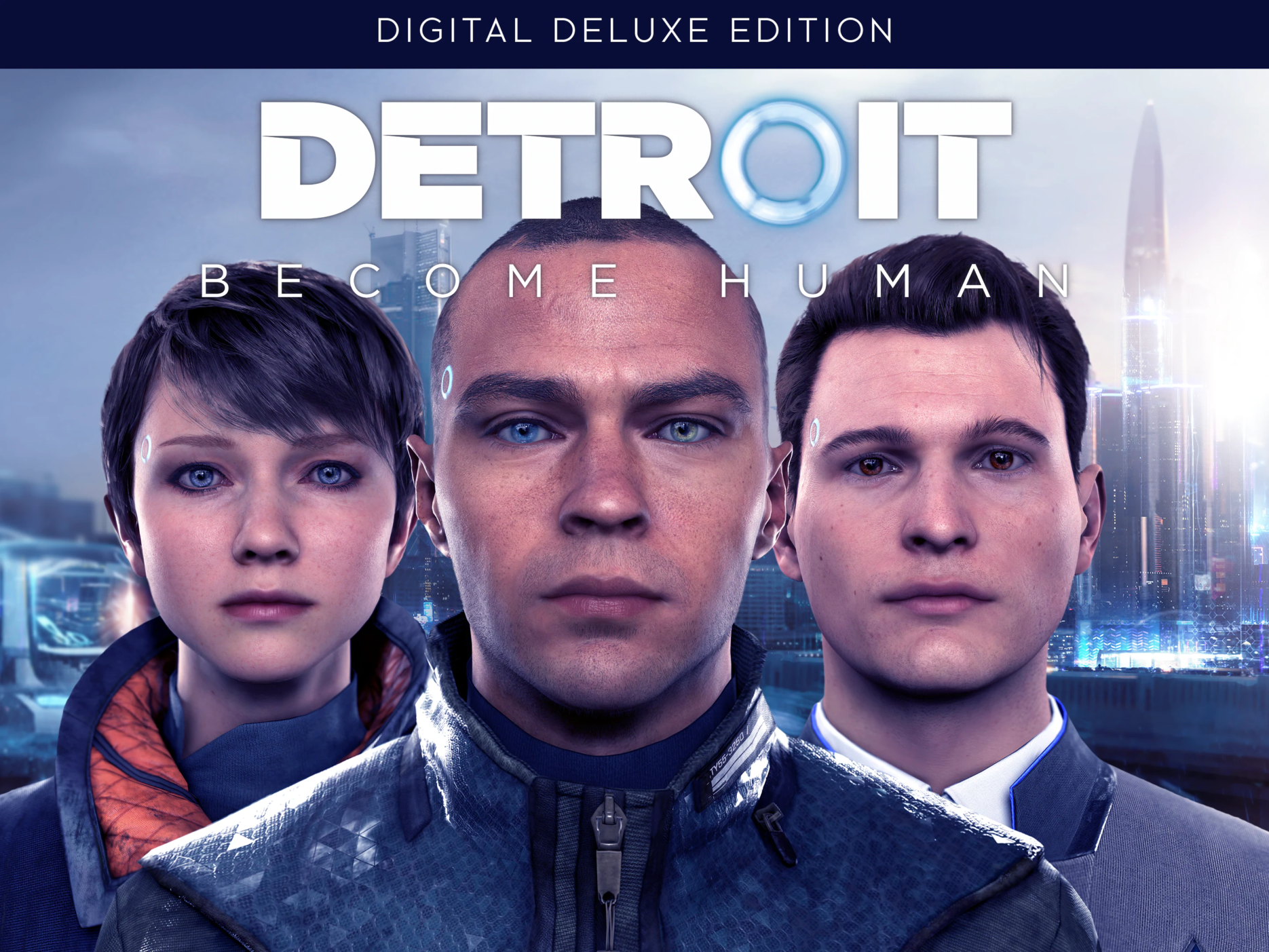I hate the trolley problem. Its a thought experiment where an observer has to decide whether to save a group of people from being hit by a trolley by making the trolley hit a single person. How could I know what I would do in that situation? I first heard of the trolley problem in my freshman year of high school. Later that year, I was given the chance to decide the fate of an entire species.
My previous statement may have been exaggerated. Actually, I was given a copy of the game Detroit: Become Human and played the entire thing in one weekend. One of my friends has been a huge fan of the game and created a diagram of all of the different endings in the game. There are technically around eighty-five endings to the game, but there’s debate on whether smaller variations count as an entirely different ending. I had a copy of the diagram and memorized most of the major endings along with most, if not all, of the smaller variations prior to playing the game. Because the game was focused on human rights (technically android rights), my strong sense of moral justice decided for me that it would be important.
Describing My “Experience”
The first time I played Detroit: Become Human, I experienced moral omniscience, which the course website’s experiences glossary describes as “a clear sense of what is right and what is wrong.” The game is played through three different perspectives and is about androids rebelling against humans and demanding their own rights.
The first android is Connor, a detective android assigned to hunt down deviants (androids that deviate from their programmed tasks and behaviors). Connor is assigned to hunt a deviant group and while doing so, he begins to deviate. The player can decide whether Connor becomes a deviant or preserves himself to continue the hunt. When I played, I made Connor deviate and help the android cause. I didn’t feel as thought I had another choice. The entire game is an allegory for oppression. If I did not have Connor deviate, I was siding with the oppressors. Even in a game, I didn’t want to do that. While I knew it was just a game and was not that serious, it was that serious. I made Connor make the choices I would make in his situation. I played him as myself.
The second android introduced is Markus, a caretaker android who becomes deviant and decides to free the other androids. As the game went on, I thought Markus was supposed to be Jesus. He is made out to be a messiah figure, and being raised Catholic, I immediately thought of Jesus. Markus leads the androids in the rebellion against humans and the fight for equal rights. Playing as Markus, I knew to keep things as peaceful as possible during the rebellion so that the androids would be granted rights. If the androids wanted the same rights as humans, I had to make them follow the same laws as humans.
The third android introduced is Kara, a housekeeping android who becomes deviant and is responsible for a little girl named Alice. The most positive ending for Kara and Alice is them entering Canada, where there are no laws involving androids. Throughout the game, it isn’t a clear which choices will get Kara and Alice to the most positive ending, but because I knew all of the endings, I made sure I was playing the route to get Kara and Alice to Canada. In my experience, playing Kara’s story was the easiest because the most “right” thing to do was anything that kept Alice, the child, safe. And then I found out Alice was actually an android and not a human child, and realized that many of my decisions about keeping her warm or trying to feed her did not matter because she would have survived anyway.
Due to my prior knowledge of all of the endings, I did not feel the moral dilemma. I knew that it was there and that I was supposed to struggle with my choices throughout the game. But, because I knew how to get to the “best” endings where the androids were respected, I did not consider choices other than the ones I made.
The Narration Technologies
The plot of the game was entirely based on poetic justice. According to the “technologies by element of narrative”, poetic justice is “…having good things happen to ‘good’ people and bad things happen to ‘bad’ people.” When the androids did something good, they were rewarded. When they did something bad, they were punished. Throughout the entire game, there were little arrows representing deviancy (being a deviant was considered good, preservation was not) and the arrows would show if the android became more or less deviant based off of the player’s decisions.
Did I Actually Experience This Game?
In playing Detroit: Become Human, I encountered the narrative technology “knowing the ending” as I already knew every outcome in the game. While the diagram of endings I had did not give me the full experience of the game, it did prevent me from the true experience. The point of the game is to make choices without knowing the immediate outcome or how it would impact the future of the specific android. I was always making the “right” choice, rather than whatever may have felt right in the moment if I had not known exactly what would’ve led me to my intended ending. It is likely that others would have played this game in my same circumstances and seen an “obvious wrong choice” but I did not. I only saw the single “right” choice and that is what I chose. Even without feeling a moral dilemma or truly experiencing the game, one may have been happy to make their choices and feel like they hadn’t made any mistakes. I, however, was not. I enjoy messing up in games. It frustrates me sometimes, but how is a game fun if you never mess up? Had I not been so focused on one specific ending, I would have made mistakes that ultimately gave me a different outcome. Also, if I had not known the possible endings, I would have made many different decisions. Upon replaying the game, many of my initial choices did not feel true to what I would have chosen. My experience with this game was surface level due to knowing all of the endings. I did not feel the moral dilemma throughout playing and because of that, I did not truly experience the game.
An Unjust Allegory for Injustice
While I do not feel that I truly experience this game, I do have many opinions about it from my first play-through. If I made all of the “right” choices and made it to the “best” ending in the game, why did the end feel wrong? The story was an epic simile. According to the “technologies by element of narrative, an epic simile is “a simile that takes a non-human thing (an animal, a plant, etc.) and offers it as a metaphor for the human experience. While there were arguments online about whether or not the creators intended for it to be an allegory for racism, there too were many parallels between the game and real-life racism for me to think otherwise. The androids were forced to do all of the work humans did not want to do, in the same way that slaves were made to do the work white people did not want to do. The androids had to fight hard and long for rights, and were not seen as equal. The same thing happened in real-life with racism. However, the end felt too unrealistic. Prejudice did not disappear because the government decided androids deserved the same rights as humans. Prejudice did not disappear when black people finally had the same legal rights as white people. The use of androids as an allegory for racism also felt unjust. Androids are not humans. In the game, they are superior to humans and can be a genuine threat based on the choices the player makes. People of color are, obviously, humans and not a threat, so this parallel felt unjust. I didn’t realize this until I actually played the game myself.
There are not many games with the same experiences as Detroit: Become Human. While I enjoyed the game and have replayed it, I was not, and still am not, a fan of the injustice in using references to real-life racism as a device in a game about androids.
Works Cited
Experiences Glossary – Story & The Brain. https://unewhavendh.org/story-and-the-brain/experiences-glossary/. Accessed 1 Feb. 2025.
Technologies by Element of Narrative – Story & The Brain. https://unewhavendh.org/story-and-the-brain/technologies-by-element-of-narrative/. Accessed 1 Feb. 2025.
Featured Image
Poster for Detroit: Become Human ™ © 2018 Sony Interactive Entertainment LLC. Published by Sony Interactive Entertainment Europe. Developed by Quantic Dream. ‘Detroit: Become Human’ is a trademark or registered trademark of Sony Interactive Entertainment Europe. All rights reserved.




